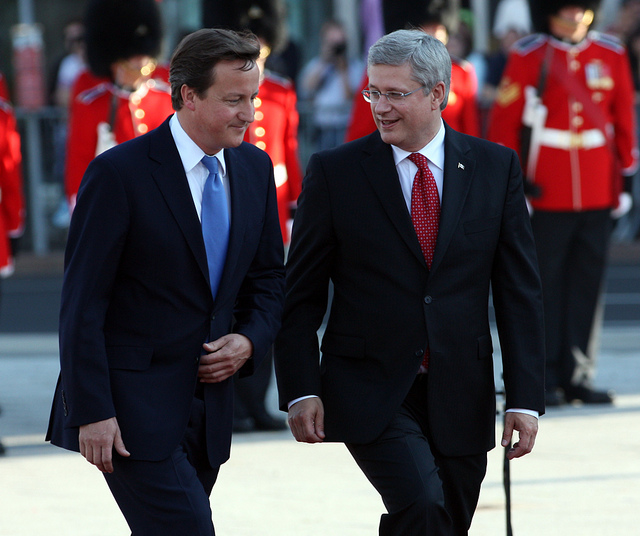The Guardian UK warns of the prospect of a Conservative minority or even majority government come the October 19 federal election.
It reports, “The reason parallels the situation in the UK, where David Cameron returned with a majority of seats conjured from a bare plurality of votes.” In the recent U.K. election, 66.1 per cent of eligible voters voted, with 36.9 per cent of the popular vote giving Cameron a majority government with 51 per cent of the seats in Parliament. That roughly compares to the 2011 election in Canada when 61 per cent of eligible voters voted, with 39.6 per cent of the popular vote giving Harper a majority government with 53 per cent of the seats in Parliament.
The Guardian UK article then highlights, “As deadlock looms and commentators descend into familiar demands for electoral reform, the leftwing campaign group Council of Canadians has launched a voter registration campaign, confident that increasing the last campaign’s historically low 61 per cent turnout will accomplish the necessary work automatically.”
“‘It’s a complicated situation,’ says the council’s head, Maude Barlow. ‘But if we can get the issues out and get more people voting, we can get rid of Harper even if there isn’t any formal coalition ahead of time.’ Barlow accuses the Conservatives of hollowing out Canadian civil society, cancelling thousands of programmes, rescinding grants, removing regulations, shutting institutions and rescinding the tax-exempt status of annoying charities. ‘They don’t care about us and I don’t believe they try to represent us,’ she says. ‘They only care about the 35 per cent of the population they want to vote for them.'”
It has been well established that a low voter turnout will benefit the Conservatives. Duncan Cameron writes, “The 25/60 rule says when only 60 per cent of Canadian citizens go out to vote, 25 per cent of the voters can deliver a majority government.” Elections Canada says there were 24.2 million eligible voters in the last federal election. The Harper Conservatives received their majority with just 5.8 million of those votes. But more than 8.8 million Canadians voted for other parties and 9.4 million Canadians did not vote. 5.8 million Conservative votes from 24.2 million eligible voters is 23.9 per cent. Cameron says, “The disengagement from the electoral process is the key to the success of the Conservatives in Canada and of right-wing politics elsewhere.”
So far, the Council of Canadians has held six Go Vote town hall meetings that have asked people both to pledge to vote and to volunteer to do door-to-door canvassing to get others to pledge to vote. And we have organized events on five university campuses to encourage students to vote. We have focused on youth because Elections Canada has estimated that 38.8 per cent of eligible voters between the ages of 18 to 24 voted in the May 2011 federal election. That’s significantly lower than the official turnout of 61.1 per cent for all voters and almost half the 75.1 per cent rate for voters ages 65-74.
Last week, the Council of Canadians also launched its Rock the Vote Summer Challenge. Our youth vote campaigner Brigette DePape says, “In 2011, 2/3 of young people did not vote in the last election, that is 1.8 million eligible youth, and meanwhile, the Harper government got a majority with just over 6,000 votes in key ridings. Young people are more likely to vote progressively, and if more of us voted, we could be game-changers. …Over the course of the summer, youth will be collecting vote pledges at concerts, festivals, in parks and coffee shops, at university/college summer schools, BBQs, and just about anywhere that we hang out.”
We’ll also have at least four more Go Vote town halls featuring Barlow with stops planned in Scarborough (June 1), Toronto (June 18), London (June 22) and Comox (June 24).
And we’ll be in Ontario Superior Court this July 2-3 seeking an injunction to suspend key provisions of the Harper government’s C-23, the so-called Fair Elections Act. C-23 forbids voters from using the Elections Canada voter information card as proof of residency. 400,000 voters used this card for that purpose in the 2011 election. C-23 also sets up a more restrictive process around vouching. Vouching allowed an additional 120,000 voters to vote in 2011. Our lawyer Steven Shrybman says, “Remember that a few hundred votes, even a few dozen votes, can determine the outcome of an election in any riding.”
The stakes are high. Columnist Chantal Hébert has argued, “History suggests that returning Harper to power could result in even more radical change.” To read about the radical change that Harper has already made, please read Barlow’s Broken Covenant: How Stephen Harper Set out to Silence Dissent and Curtail Democratic Participation and Common Causes: Progressive forces acting together to build a better society reports.
For more on our democracy campaign, please click here.



